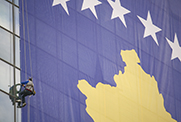I recently came across a children’s book called “The Mission of Snow White: The Children Toward NEWBORN.” Through fictional characters, it depicts key political events along Kosovo’s path to statehood.
Snow White is the main protagonist, and she personifies the international community. Her mission is to help the children — who represent the people of Kosovo — to pass three phases in order to become a “free country.”
In the first phase, she is helping the children by providing them with food and clothes. The second phase is focused on “advancing the country.” And in the third phase, before she is about to depart, she sets out to make it possible for them to become “a good country for all to live in, without exception,” and a country that is led by the children themselves.
In reality, Snow White has not left, the children are fighting over toys and gifts, and the country has not become “a good place for all.”
Similar narratives have also been manifested in how #Kosovo10 is being marked. From Kosovo’s embassies abroad publishing social media posts on how they will be celebrating “our young country’s independence” to state and government leaders calling recent sports medals “presents for Kosovo’s 10th birthday.” To add to it, in this year’s increased coverage by foreign journalists, I was even asked whether Kosovo will, or should, continue to be an independent country.
Reading such stories is not necessarily a novelty in terms of how narratives about Kosovo have often been established. It is the perpetuation of the NEWBORN notion — the relation of ‘teacher’ vs. ‘pupil,’ ‘parent’ vs. ‘child,’ ‘savior’ vs. ‘victim,’ ‘the knowledgeable’ vs. ‘the unaware.’
All the while, in reality, Snow White has not left, the children are fighting over toys and gifts, and the country has not become “a good place for all.”
One aspect of this has to do with what all these narratives have in common — they all attempt to strip Kosovo, and most importantly the citizens, of any sense of agency, be it individual or collective. And agency is key to how individuals in a society not only define themselves, but also participate in its shaping.
So, as Kosovo’s 10th anniversary is being marked, it’s natural to reflect on what the past decade has meant, brought and failed to deliver.
On one hand, there is the capturing of the institutions, and this has been said over and over again. The 2016 wiretaps were just a confirmation of an already accepted public truth, showing how public institutions and agencies that deliver services ranging from green card vehicle insurance to energy infrastructure and tax administration have been up for grabs for those close to politics.
But on the other, I find myself particularly drawn to look at the ways in which the discourse of statehood has been captured to the same extent. All too often, the state is referred to as the government; the government is seen as power; and the individuals within the institutions (representatives), are called the rulers.
Such expressions can be seen as language that merely illustrates established practices. But it also means that the state has become synonymous with the ways of the political establishment and political class. Internalizing and accepting such meanings risk ‘legitimizing’ or ‘normalizing’ their practices, and even ends up affecting our relationships with one another, with the institution, and consequently how, whether and what kind of accountability is sought. If we don’t challenge the language, and if we don’t remind ourselves about the essence of what a state embodies, then as citizens we also risk becoming culpable for its decay.
All too often it seems that the Constitution is accepted as an incidental ‘legal document’ that is simply a bureaucratic requirement of a country that wants to be independent.
I came across an example of such a situation recently, when submitting the documents for my driver’s test at a department of the Ministry of Transport. After waiting over half an hour in a queue that kept growing by the minute because the counter had not opened on time, I knocked on the glass window in the hope that someone would hear. When a clerk emerged and I asked whether there was a reason that services had not started, or when they would, she replied: “They’ll be here soon; they are busy people. They are high officials of the state.”
Well, in fact, they are civil servants — as I responded to her as well. But even if they were ‘state officials,’ their obligation and responsibility would still rest in the same place — toward the citizen.
So while the most frequent colloquial criticism is “there’s no state here,” lets in fact remember that the state is defined through its citizens, and at its core is citizenship. And this cannot be a selective reading, interpretation or practice, as is often the case.
In this vein, all too often it seems that the Constitution is accepted as an incidental ‘legal document’ that is simply a bureaucratic requirement of a country that wants to be independent. All too rarely is it seen as serving as the foundation upon which the state is established — one where justice and equality are fundamental values that everyone upholds and prescribes to.
Most guilty of this are those that are supposed to be leading by example. Instead, they gather at odas to celebrate with gunfire when a former minister of infrastructure is acquitted of corruption charges. And after performing their narrow, limited understanding of how Albanian men ‘should behave,’ the prime minister justifies their actions in response to criticism by saying: “Well, it’s always been in our tradition to shoot in moments of celebration.”
Such a statement by a prime minister, not only validates reckless actions, but in making it he acts as though he has the right to define tradition itself.
But citizens, and especially the youth of today, don’t want to drive a car without a driver’s license, or travel without green card insurance, or have a gun in their pockets to skip traffic. They want the Constitution to protect them, based on rules and standards just as much as values established on the principles of justice and fairness.
There is a new generation that is seeking to challenge and question just about anything thrown their way.
And a change in mindset is beginning to become noticable. On so many different occasions recently, I have heard younger people say: “Can we stop talking about 1999 and the war? Can we talk about something more positive!”
This is disheartening, and speaks of a collective failure to provide a narrative of the past that both acknowledges the suffering, while paving the way for a more just future. The greatest responsibility for this falls upon the political class of these past 20 years. By perpetuating a singular narrative of the past in order to claim a self-prescribed legitimacy for power in the present, they have stripped it of any real meaning and young people today have difficulty identifying with it.
At the same time, there are other ways in which young people are being denied the freedom to dream, by being confined within the borders of a country of 1.8 million people.
The embassies of Kosovo in France and its counterpart in Prishtina, have decided to offer a temporary solution to this by making it possible for Kosovars to visit Paris this February 17 — virtually that is. They call it “Teletransportation” and are placing screens in downtown city streets to allow citizens in each country to meet one another — with the sale that this “will enable you to see and greet passersby, or to setup a virtual meeting with friends and family living in France.”
For a generation of Kosovars who are more isolated than any before them, who are constantly having visa applications rejected at embassies, this is not just an irony, but an insult. While any French or ‘European’ citizen can just hop on a plane to visit Kosovo, that same right is being denied to Kosovo’s citizens.
Kosovo’s youth have begun to show that they will not simply accept a fate that is served to them. There is a new generation that is seeking to challenge and question just about anything thrown their way. They are not just joining a discussion in order to curse at the state and its flaws, but are entering a debate to bring constructive critique for its betterment.
As the country turns the page of a decade, the struggle is no longer only about the narratives of how we got here, but about where we are heading.
Independence is being redefined not just by the borders of the country, but by demanding and creating opportunities both for the individual and for society. And it is this kind of determination that makes a state.
Back in that book, where the story ended in 2008, the “children” promised Snow White that they would build a “good country for all to live in.” That is where the story went wrong. The “children” should not have been making that promise to her, but to themselves — and to each other.
So on this 10th anniversary, citizens are the protagonists, and they are taking back their agency. As the country turns the page of a decade, the struggle is no longer only about the narratives of how we got here, but about where we are heading.
I think that one way of doing that is not by looking at February 17 merely as the day of independence, but as the Day of the Republic.
Because at the end of the day, someone else may go down in history for having declared independence, but they will not go down in history for having shaped the Republic. That depends on all of us.K
Feature image: Majlinda Hoxha / K2.0.

Back to Kosovo X Monograph


